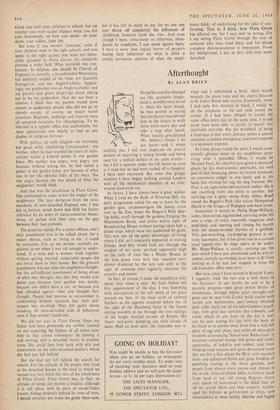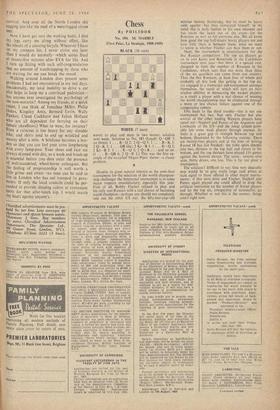Afterthought
By ALAN BRIEN
In theory, I have always been a great walker. When I lived on the flank of Primrose Hill, my daily programme called for me to leave by the garden gate, circumnavigate the hump, cross over to the Zoo, bisect the Regent's Park play- ing fields, stroll through the gardens fringing the Marylebone Road, and arrive within sight of Broadcasting House without having taken half a dozen steps which were not cushioned by grass. This was one of the great advantages of living where I did, as I constantly explained to visiting friends. And they would look out through the window of my eyrie, perched apparently high on the tufts of trees like a Wendy House, at the lush green vista with that resentful envy always displayed by the lazy and unfit at the sight of someone who regularly exercises his muscles and sinews.
In fact, of course,-I made the expedition only about four times a year. An hour before my first appointment of the day, I was humming with anticipation of the soft swish of wet grass around my feet, of the loud rattle of tattered feathers as the pigeons scattered before me, of the sight of the Hapsburg faces of the llamas staring moodily at me through the iron railings, of the bright mottled crowds of flowers like Ascot race-goers pumping out their clouds of scent. Half an hour later, the timetable was re- vised and I substituted a brisk, short march beneath the plane trees and the cherry blossom to St. Johns Wood tube station. Eventually, when I had only five minutes in hand, I would be on the telephone to the cab rank round the corner. If I had been obliged to attend the same office every day at the same time, I would never have been able to justify to myself this inevitable taxi-ride. But the drawback of being a freelance is that every journey seems a special occasion, a sudden emergency, and every expense is a necessary expense.
As I was driven round the park, I would occa- sionally glimpse some of my neighbours prac- tising what 1 preached. Often it would be Michael Foot, his cheerful eyes given a maniacal gleam by his mad-scientist spectacles, his wild pad of hair bouncing above his brainy forehead, an enormous cudgel in one hand, and at his heels that trotting fur rug, the dog Vanessa. Mr. Foot is an eight-miles-before-lunch walker. He is not travelling from one point to another, but carrying out a great sweep from Abbey Road round the Regent's Park lake across Hampstead Heath to the fringes of Highgate and back home.
Sometimes it would be Philip Hope-Wallace, lanky, blue-suited, egg-headed, carrying under his arm a copy of every reputable magazine ever published, and opening and closing his mouth with the absent-minded rhythm of a goldfish. This jaw-stretching, lip-popping gesture is en- tirely automatic, but it has given rise to a curious local legend that he sings opera as he walks. Mr. Hope-Wallace is usually carrying out the plan which I have just abandoned and he will re- appear, entirely un-winded, in an hour in El Vino looking as if he had just stepped in from the old Guardian office next door.
But now, since I have moved to Kentish Town, I regularly walk the two and a half miles to the Spectator. It can hardly be said to be a pastoral progress—past great prison blocks of warehouses, through whose great wrought-iron gates can be seen little Gothic brick castles with turrets and battlements; past' twenty identical dark cafés, built out of tin advertisement hoard- ings, with grey lace curtains like cobwebs, and inside which at any hour of the day a man can be seen wiping his lips with the back of his hand as he pushes away from him a half-full plate of egg and chips; past miles of plate-glass windows announcing 'Sensational Reductions' in furniture coloured orange and green and made, apparently, of bakelite and rubber; past three Underground stations and great devastated areas like sets for a film about the Blitz, with smashed walls and splintered floors and great bonfires of panelling roaring in the dusty gardens; past people from almost every nation and climate in the world, little old Greek ladies in funeral black from head to toe, tall young Negroes whose only splash of non-colour is the black face set off by scarlet shirts and blue trousers, middle- aged fat Italians as gold-brown as chips, with moustachios at once faintly obscene and highly
comical. And over all the North London sky sagging low like the roof of a waterlogged circus tent.
Now I have got into the walking habit, I find my legs carry me along without effort, like the wheels of a coasting bicycle. Wherever 1 have set my compass for, 1 never arrive any later than I would do normally—which seems fixed at twenty-five minutes after ETA for life. And I turn up fizzing with such self-congratulation that no amount of watch-tapping by those who are waiting for me can break the mood.
Walking around London does present some problems I had not encountered in my taxi days. (Incidentally, my total inability to drive a car also helps to keep me a convinced pedestrian— has anyone. ever investigated the psychology of the non-motorist? Among my friends, at a quick Count, I can think of Jonathan Miller, Philip Oakes, Kingsley Amis, Bernard Levin, Wally Fawkes, Claud Cockburn and Julian Holland who are all dependent for ferrying on their female chauffeurs.) What to wear, for instance? Even a raincoat is too heavy for any sizeable hike, and shirts tend to end up wrinkled and steamy after a mile. A briefcase becomes a bur- den so that you can feel your arms lengthening With every lamp-post. Your shoes and face are always skinned with dirt, so a wash and brush-up is essential before you dare enter the presence of well-laundered, wheel-borne colleagues. But the feeling of proprietorship is well worth a little grime and sweat—no man can be said to live in London who has not tramped its pave- ments. If only the local councils could be per- suaded to provide sleeping cabins at convenient spots for that after-lunch kip, I would match any heart against anyone's.



































 Previous page
Previous page